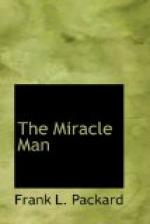“But how do you account for these miraculous cures?” they asked.
“You have seen them—the results,” Madison replied. “You know the cures to be living, vital, irrefutable facts—don’t you?”
“Yes,” they agreed.
“Then,” said Madison, “there can be but one answer—faith. There is no other—faith. Are we not, in view of what has happened, of what exists before our very eyes, forced to the belief that faith is the greatest thing, the most potential factor in the world?”
“And do you believe then that all who come here will be cured?”
Madison shook his head.
“Ah, no,” he said; “far from it. Many will come with but the semblance of faith, and for those there can be no cure—that is evident on the face of it, is it not?”
They interviewed Thornton—and Thornton, too, talked to them, but the very presence of Mrs. Thornton was weightier far than words.
They interviewed the Holmes, and they interviewed Needley individually and collectively; and they interviewed Helena—but they did not interview the Patriarch. Here Helena barred their way—they were free to enter the cottage, to copy the names, the record of gifts inscribed in the book, already a long list for Needley had required no other incentive to give than the example that had been set—but that was all. Quietly, with demure simplicity, Helena, prompted by Madison, like a priestess who guards some holy, inner shrine, told them that sensational notoriety had no place there—and the notoriety for that very cause became the greater! Not that they were denied a sight of the Patriarch’s venerable and saintly form—they were permitted to catch glimpses of him on the beach, on the lawn, walking with bowed head in meditation, a figure whose simple majesty inspired words and columns of glowing tribute—but from personal contact, Helena and the Flopper, always in attendance, warded them off; retreating always to the privacy of the cottage, to the inner rooms.
All this had taken four days; and now, on the fourth day, there came to Needley the vanguard of those who sought this new healing power—just a few of them, two or three, like far, outflung skirmishers evidencing the presence of the army corps to follow. With the reporters, as far as Madison was concerned, it was simple enough; he had but to let them go their way, to let them revel in the stories that were on every tongue, to let them view with their own eyes facts, while he, modestly and diffidently,




